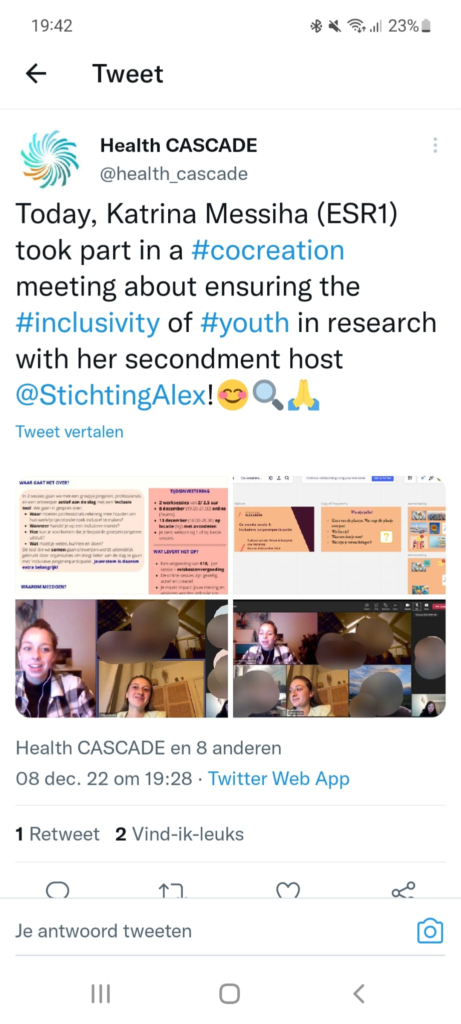
Introducing Katrina Messiha. As a Marie Skłodowska Curie PhD fellow, I’m based at Amsterdam UMC and hold the position of ESR1 as part of the Health CASCADE project, funded by the European Union (H2020 MSCA ITN; project number 956501). My PhD focus is about ‘Theory-based principles for co-creation in Public Health’, and I’m supervised by Professor Dr. Mai Chin A Paw, Dr. Teatske Altenburg and Professor Dr. Sebastien Chastin. Predominantly, in my work, I’m systematically contributing towards developing theory in order to produce principles capable of eliciting co-creation as an evidence-based methodology for public health.
Secondment with ‘Stichting Alexander’ (‘Alexander Foundation’)
As a MSCA fellow, I engage with secondments as part of the work I fulfil. The Alexander Foundation is my second host so far, and I feel fortunate to be able to collaborate with them as of November 2022. I believe their important work ties in nicely with the nature of my PhD around co-creation. Having delivered in excess of 500 projects over 27 years in close collaboration with various stakeholders, they identify as a Dutch NGO primarily dealing with youth participation and participatory youth research. The Alexander Foundation runs approximately 25 projects per year on a plethora of unique topics, from mental wellbeing to space for youth in cities to enhance physical activity. You can read more about their work, here.
An Evidence-based Versus Intuitive Approach to ‘Co-creation’
Our tentative working definition for the Health CASCADE project is given as “an evidence-based methodology for the development, implementation and evaluation of innovations through continuous, open collaboration, interactional knowledge production and shared decision-making among key stakeholders, directed at improving public health” (Messiha, 2021:5). This definition, in alignment with the wider goals of Health CASCADE, prioritises a methodology for co-creation that can be rendered from evidence. In contrast, the work and approach of the Alexander Foundation in involving their stakeholders, such as youth in research, is performed intuitively. In this case, it may be helpful to compare and contrast ‘co-creation’ practice that is inherently intuitive with the evidence about co-creation from the systematic and narrative literature. This is the primary justification behind my secondment – to be able to understand how ‘co-creation’ is demonstrated in practice (from the angle of the Alexander Foundation) and explore the extent to which an intuitive approach to ‘co-creation’ may compare with an evidence-based one.
An ‘evidence-based brainstorm’ with the Alexander Foundation

On 22nd November 2022, I presented my Health CASCADE work to the Team at the Alexander Foundation. An integral part of this, was featuring one of my reviews entitled: “Jumping off Arnstein’s Ladder Revisited: A Health CASCADE study on Dimensionality of Co-creation Research using Explicit Theory in Various Fields” for the purpose of inspiring and developing a deliberation in context of a brainstorm activity which I facilitated afterwards. This review which I led, was co-authored by Dr. Altenburg, Professor Dr. Giné-Garriga, Professor Dr. Chastin and Professor Dr. Mai Chin A Paw, and was aimed at identifying the explicit dimensions of co-creation as applied in different research fields, using a narrative and systematic approach. Our review identified 8 dimensions: Collective Intelligence, Process (as relevant to creativity, learning and innovation), Goal(s), Knowledge Translation, Social Construction (e.g., subjective meaning), Engagement (e.g., decision-making), Value (e.g., co-created value) and Tangibility/ functionality of outcomes (e.g., service development).
The brainstorm exercise (Fig.1) worked wonderfully in retrospect. It opened up a fascinating dialogue around the key considerations of executing work at the Alexander Foundation with respect to the explicit dimensions. It was also an affirming exercise since all identified dimensions from my review could be identified in their work, and interpreted using concrete examples and opinions. Some key conclusions from undertaking this brainstorm reinforced (1) how these dimensions identified for co-creation research are deeply interlinked; (2) the constraints and ideals to stem from co-creation considerations; and (3) how complex and messy co-creation can be counted as in practice.
References:
Messiha, Katrina. (2021). D1.1 – ESR1 Preliminary Synthesis. Zenodo. https://doi.org/10.5281/zenodo.6818098
